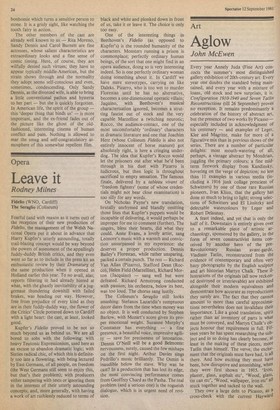Opera
Leave it
Rodney Milnes
Fidelio (KNO, Cardiff) The Seraglio (Coliseum) Fearful (and with reason as it turns out) of the reception of their new production of Fidelio, the management of the Welsh National Opera put it about in advance that Harry Kupfer's utterly astounding, totally trail-blazing concept would be way beyond the powers of assessment of the appallingly fuddy-duddy British critics, and they even went so far as to include in the press kit an enthusiastic review by their Dramaturg of the same production when it opened in Holland earlier this year. To no avail, alas; reports filtering in had already hinted at what, with the ghastly inevitability of a juggernaut thundering downhill with failed brakes, was heading our way. However, free from prejudice of every kind as they are in their fuddy-duddy way, the flower of the Critics' Circle pottered down to Cardiff with a light heart: the cast, at least, looked good.
Kupfer's Fidelio proved to be not so much beyond us as behind us. We are all bored to sobs with the following: with heavy Teutonic Expressionism, used here as an excuse to abandon dramatic logic; with Sixties radical chic, of which this is definitely too late a flowering; with being lectured by East Germans, of all people, on freedom (the West Germans still seem to enjoy this, but that's their problem); with producers either tampering with texts or ignoring them in the interests of their utterly astounding concepts; and, more generally, with having a work of art ruthlessly reduced to terms of black and white and plonked down in front of us, take it or leave it. The choice is only too easy.
One of the interesting things in Beethoven's Fidelio (as opposed to Kupfer's) is the rounded humanity of the characters. Monsters running a prison is commonplace; perfectly ordinary human beings, of the sort that one might find in an opera audience, doing so is very interesting indeed. So is one perfectly ordinary woman doing something about it. In Cardiff we have mere stereotypes, carrying on like Daleks. Pizarro, who is too wet to murder Florestan until he has no alternative, becomes a one-dimensional operatic villain; Jaquino, with Beethoven's musical characterisation ignored, becomes a strutting fascist out of stock and the very capable Marzelline a twitching neurotic; Rocco, the audience-contact, one of the most uncomfortably 'ordinary' characters in dramatic literature and one that Joachim Herz (whose Coliseum Fidelio is also not entirely innocent of horse manure) got absolutely right, is here a cringing underdog. The idea that Kupfer's Rocco would let the prisoners out after what he'd been through in his duet with Pizarro is ludicrous, but then logic is throughout sacrificed to empty sensation. The famous finale, delivered by a tableau vivant of 'freedom fighters' (some of whose credentials might not bear close examination) is too silly for any words.
On Nicholas Payne's new translation, brutally unrhymed and blandly omitting those lines that Kupfer's puppets would be incapable of delivering, it would perhaps be improper for me to comment (further). The singers, bless their hearts, did what they could. Anne Evans, a lovely artist, sang Leonore's music with a warmth and conviction unsurpassed in my experience: she deserves a proper production. Dennis Bailey's Florestan, while rather unsparing, packed a certain punch. The rest — Richard Van Allan (Pizarro), Stafford Dean (Rocco), Helen Field (Marzelline), Richard Morton (Jacquino) — sang well but were defeated. Richard Armstrong conducted with passion; his orchestra, below its best, was too loud. The chorus sang lustily.
The Coliseum's Seraglio still looks smashing: Stefanos Lazaridis's sumptuous decor dates from the time when money was no object. It is well conducted by Stephen Barlow, with Mozart's score given its proper emotional weight. Suzanne Murphy's Constanze has everything — a fine presence, a beautiful voice, impressive agility — save for preciseness of intonation. Dennis O'Neill will be a good Belmonte: nervousness, surely, caused the few mishaps on the first night. Arthur Davies sings Pedrillo's music brilliantly. The Osmin is inaudible below the stave. Why was he cast? In a production that has lost its edge, the most convincing performance comes from Geoffrey Chard as the Pasha. The real problem (and a serious one) is the rogueish dialogue, which is in urgent need of revision.
































 Previous page
Previous page